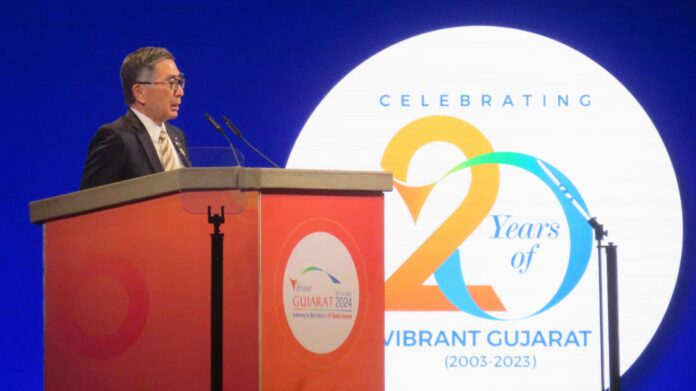- Suzuki Motor President Toshihiro Suzuki announced at an investment summit in Gujarat
- Maruti Suzuki is a India’s leading car manufacturer
- the company plans to produce biogas from cow dung
BENGALURU: Maruti Suzuki, India’s leading car manufacturer, is set to invest 350 billion rupees ($4.2 billion) in the construction of a new factory in Gujarat. This move comes as both local and international competitors ramp up their expansion strategies.
The new factory, which is projected to commence production by the end of the fiscal year in March 2029, will enhance the company’s annual production capacity by 1 million units. This was announced by Suzuki Motor President Toshihiro Suzuki at an investment summit in Gujarat.
In addition, the company plans to invest another 32 billion rupees to introduce a new production line for electric vehicles at its existing factory in Gujarat. This initiative aligns with Prime Minister Narendra Modi’s ambition to attract more investment to his home state. The company anticipates that the new line will be operational by the fiscal year 2027, increasing the current factory’s annual capacity by 33% to 1 million units.
Maruti Suzuki is also constructing a new plant in Haryana, a northern state of India. The plant, which is scheduled to start production in 2025, is expected to manufacture 1 million vehicles annually by 2028.
These expansion efforts align with Maruti Suzuki’s goal to increase its total capacity to 4 million units by the fiscal year 2031, a significant increase from its current annual capacity of 2.25 million units.
While the company plans to launch its first battery-operated vehicle in India later this year, Maruti Suzuki is committed to a “multi-pathway” approach to reducing greenhouse gas emissions. This means that in addition to vehicle electrification, the company will explore multiple alternatives such as compressed natural gas, biogas, bioethanol, and green hydrogen. Leveraging India’s abundant livestock resources, the company plans to produce biogas from cow dung. Suzuki has already initiated the construction of four biogas plants in Gujarat.
Established as a state-run enterprise in 1981 and later acquired by Suzuki Motor in 2007, Maruti Suzuki captured the attention of India’s middle class with compact cars like the Maruti 800 and Zen. These affordable, small, sleekly designed cars stood in stark contrast to the larger alternatives such as the Ambassador by Hindustan Motors and the Premier Padmini by a division of the Walchand Group.
Maruti Suzuki has maintained its position as India’s top car manufacturer, thanks to the consistent demand for its cost-effective hatchbacks. However, the company’s market share has recently declined due to the rising demand for sports utility vehicles (SUVs), as India’s growing affluent population prefers larger cars.
In 2022, car manufacturers sold 1.6 million SUVs compared to 1.32 million hatchbacks, representing 42% and 35% of the market respectively, as per research firm JATO Dynamics.
Maruti Suzuki, which had been trailing in the SUV segment until recently, saw its market share drop to 40.3% in December 2023 from 41.4% in December 2022. The company was responsible for one out of every two vehicles sold in India before the onset of COVID-19 in early 2020.
In response, Maruti launched new SUV models like the Grand Vitara, Invicto, and Jimny over the past year. However, these models face fierce competition from domestic rivals such as Tata Motors and the Mahindra group, as well as international automakers like Renault, Nissan, Honda, Hyundai, and Kia.
Tata Motors, which plans to launch three new electric SUVs this year, saw its market share increase to 14.9% in December 2023 from 13% in the same period the previous year. Similarly, the market share of the Mahindra group rose to 10.7% from 9.7% during this period, according to the Federation of Automobile Dealers Association.







